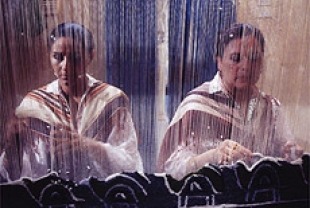In Tunis, Aïcha (Rabiaa Ben Abdallah) lives apart from her husband Saïd (Ezzedine Gennoun). She weaves carpets and stays in close contact with her two daughters reside with her — Emna (Hend Sabri), a violinist, and Meriem (Ghalia Ben Ali), who has been unable to consummate her marriage. Aïcha's sister-in-law Zeineb (Sabah Bouzouita), who was abandoned by her husband on the day after her wedding, helps her take care of her autistic son, Aziz (Adel Hergal).
Convinced that the boy needs another environment for his well-being, Aïcha decides to return to the family home on the island of Djerba. Arriving there, all of the women experience painful memories of the past. It is the island tradition that the men go to Tunis eleven months a year to work leaving the women behind. Their one month together — the season of men — is devoted to conceiving children — preferably males.
Writer and director Moufida Tlatli has fashioned a bittersweet film about the plight of women in a traditional Islamic milieu where they are totally subservient to men. In flashbacks, we sense the immense frustration of Aïcha. Her authoritarian mother-in-law (Mouna Noureddine) resents her talent for weaving beautiful carpets and lords over her in the household. After two unsuccessful attempts to give Saïd a son, Aziz is born. But her husband is unhappy with this "problem child" and eventually leaves because of him.
Tlatli's film reveals how Aïcha's daughters are emotionally scarred by their mother's unhappiness and frequent humiliations at the hands of her husband and mother-in-law. Although there are a few scenes that effectively convey the sisterhood of these oppressed women, most of the time we are left with a keen sense of their deep sadness and sexual frustration. The only hopeful note comes at the end of the drama where Aziz takes up the craft of weaving and seems to be on the mend.
